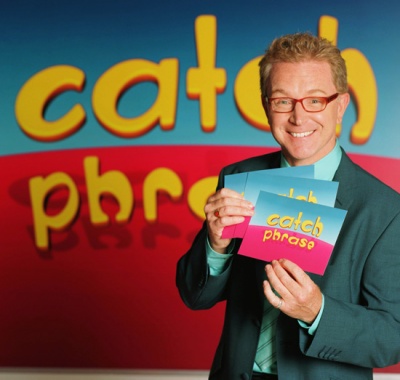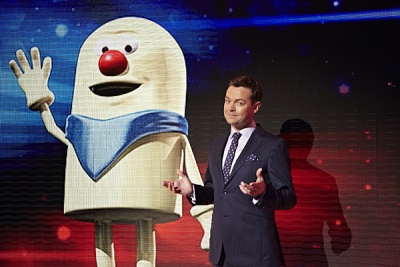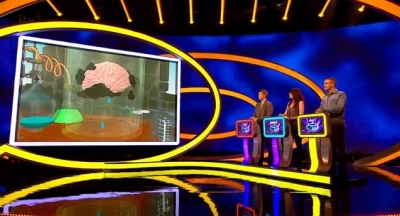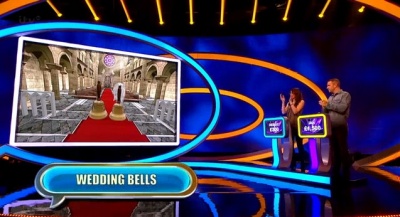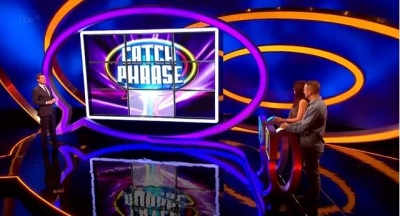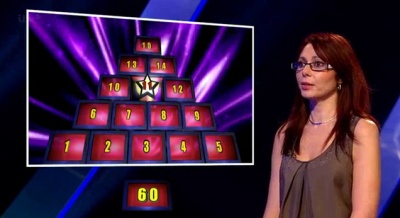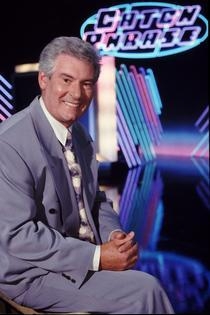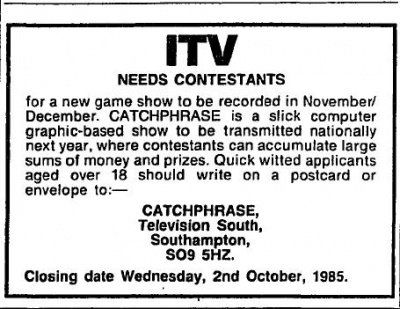Catchphrase
(→Catchphrases) |
m (→Synopsis) |
||
| (23 intermediate revisions not shown) | |||
| Line 4: | Line 4: | ||
== Host == | == Host == | ||
| + | |||
| + | [[Nick Owen]] (non-broadcast pilot) | ||
[[Roy Walker]] (1986-99) | [[Roy Walker]] (1986-99) | ||
| Line 55: | Line 57: | ||
After each puzzle, that person got a chance at the Bonus Catchphrase. This was covered by nine squares. One was picked at random and removed then they were allowed a guess. If they got it right, they won whatever was in the Bonus Bank (originally a flat 100+(round number x 50), eventually turning into 100+ round number times 50, take away 10 for every square already uncovered, plus the number of letters in the month etc...). If wrong, they did another puzzle and so on until someone got it. Repeat as required, sprinkle liberally with extra money for each round. | After each puzzle, that person got a chance at the Bonus Catchphrase. This was covered by nine squares. One was picked at random and removed then they were allowed a guess. If they got it right, they won whatever was in the Bonus Bank (originally a flat 100+(round number x 50), eventually turning into 100+ round number times 50, take away 10 for every square already uncovered, plus the number of letters in the month etc...). If wrong, they did another puzzle and so on until someone got it. Repeat as required, sprinkle liberally with extra money for each round. | ||
| - | <div class="image">[[File:Catchphrase off1.jpg]]''Host [[Roy Walker]] on the set of Catchphrase - surely one the most durable in the business, it hardly changed in over a decade except for the logo.''</div> | + | <div class="image">[[File:Catchphrase off1.jpg]]''Host [[Roy Walker]] on the set of Catchphrase - surely one of the most durable in the business, it hardly changed in over a decade except for the logo.''</div> |
After the break, there was always the faster-moving Ready Money Round where there was no bell. Which was nice. Incidentally, we're told that one of the reasons that the show had a bell was to slow down the rate that money was earnt, the show gave away potentially large cash prizes and back in the day there were limits TV companies had to adhere to in the prizes they gave away. | After the break, there was always the faster-moving Ready Money Round where there was no bell. Which was nice. Incidentally, we're told that one of the reasons that the show had a bell was to slow down the rate that money was earnt, the show gave away potentially large cash prizes and back in the day there were limits TV companies had to adhere to in the prizes they gave away. | ||
| Line 63: | Line 65: | ||
''Mr Chips can't believe his luck - it's the Ready Money Round''</div> | ''Mr Chips can't believe his luck - it's the Ready Money Round''</div> | ||
| - | The person with the most money at the end of the show went forth to the Super Catchphrase. A grid of 25 lettered squares flashed up. Behind each one was a Catchphrase. If they got 5, they won an extra £50 (or £500 from 1997). However, if they did that by going through the 'M' square (which they claimed to be the "difficult" one but we personally didn't believe that for a moment) they won a lovely holiday in somewhere exotic like Bali! PLUS! Spending money. | + | The person with the most money at the end of the show went forth to the Super Catchphrase. A grid of 25 lettered squares flashed up. Behind each one was a Catchphrase. If they got 5, they won an extra £50 (or £500 from 1997). However, if they did that by going through the 'M' square (which they claimed to be the "difficult" one but we personally didn't believe that for a moment) they won a lovely holiday in somewhere exotic like Bali! PLUS! Spending money. Rather disappointingly, nearly all contestants took the vertical route on the board - sure, it was the most obvious route to take, especially while under pressure, but we would have liked to have seen at least some contestants take the horizontal route or one of the diagonal ones, if only for some variety. |
<div class="image"><IMG src="/atoz/programmes/c/catchphrase/endgame.jpg" alt="endgame.jpg" width="320" height="240"> | <div class="image"><IMG src="/atoz/programmes/c/catchphrase/endgame.jpg" alt="endgame.jpg" width="320" height="240"> | ||
| Line 92: | Line 94: | ||
<div class="image">[[File:StephenandMRChips.jpg|400px]]''Don't look behind yourself Stephen Mulhern, it's a scary looking Mr.Chips.''</div> | <div class="image">[[File:StephenandMRChips.jpg|400px]]''Don't look behind yourself Stephen Mulhern, it's a scary looking Mr.Chips.''</div> | ||
| - | Round 1 begins with a elimination round with three contestants having to guess quickfire catchphrases until two contestants have guessed three catchphrases correctly. The two winning contestants then proceed to the next round, but the third contestant is sent home. We really don't understand why this was added in at the top of the show with one contestant being eliminated very early because the elimination round is really just padding to fill in the 45 minute time slot and a waste of time for the eliminated contestant. | + | Round 1 begins with a elimination round with three contestants having to guess quickfire catchphrases until two contestants have guessed three catchphrases correctly. The two winning contestants then proceed to the next round, but the third contestant is sent home. We really don't understand why this was added in at the top of the show with one contestant being eliminated very early because the elimination round is really just padding to fill in the 45 minute time slot and a waste of time for the eliminated contestant. However, in the (largely entertaining) Celebrity charity specials, all three contestants play throughout the game so the elimination round is not played. Why this couldn't have been adopted for the civilian editions remains a mystery! |
<div class="image">[[File:Catchphrase 1.jpg|400px]]''The big giant egg set and screen.''</div> | <div class="image">[[File:Catchphrase 1.jpg|400px]]''The big giant egg set and screen.''</div> | ||
| - | Round 2 is what we call "Classic Catchphrase", which is basically the show as we know with the same rules that applied from the past years. The values of money for the bonus catchphrase are higher than the past years with £500 to be won in round 2 and £1,000 to be won in round 3, but the only difference is that there is no £10 reduction punishment for every square that is removed if the contestant doesn't know or incorrectly guesses the catchphrase. | + | Round 2 is what we call "Classic Catchphrase", which is basically the show as we know with the same rules that applied from the past years. The values of money for the bonus catchphrase are higher than the past years with £500 to be won in round 2 and £1,000 to be won in round 3, but the only difference is that there is no £10 reduction punishment for every square that is removed if the contestant doesn't know or incorrectly guesses the catchphrase. In the celebrity versions, as alluded to above, Classic Catchphrase begins immediately. Round 1 adopts the £100 and £500 rule with Round 2 designating £200 and £1000 and Round 3 offering £300 per correct answer with a whopping £1500 for the bonus Catchphrase! To quote the Cat from Red Dwarf, 'Well, what the hell - it's for a good cause!' |
<div class="image">[[File:Catchphrase 2.jpg|400px]]''Did you get that catchphrase right?''</div> | <div class="image">[[File:Catchphrase 2.jpg|400px]]''Did you get that catchphrase right?''</div> | ||
| Line 102: | Line 104: | ||
<div class="image">[[File:Catchphrase 4.jpg|400px]]''5 seconds, here we go.''</div> | <div class="image">[[File:Catchphrase 4.jpg|400px]]''5 seconds, here we go.''</div> | ||
| - | The final round is as always the dreaded ''Super Catchphrase''. As always, the same rules applied from the past years but the contestant now has to guess five catchphrases correctly by climbing up a pyramid of fifteen numbered blocks consisting of catchphrases within 60 seconds. Each time the contestant guesses a catchphrase correctly on each level from bottom to top, the money increases every time from £2,500, £5,000, £10,000, £25,000 and £50,000. But wait, there's more, No. 11 on the third level has a star in the middle, where if the contestant chooses that number and correctly guesses the catchphrase, they could win a holiday as well. | + | The final round is as always the dreaded ''Super Catchphrase''. As always, the same rules applied from the past years but the contestant now has to guess five catchphrases correctly by climbing up a pyramid of fifteen numbered blocks consisting of catchphrases within 60 seconds. Each time the contestant guesses a catchphrase correctly on each level from bottom to top, the money increases every time from £2,500, £5,000, £10,000, £25,000 and £50,000. But wait, there's more, No. 11 on the third level has a star in the middle, where if the contestant chooses that number and correctly guesses the catchphrase, they could win a holiday as well. When a celebrity tackles the Super Catchphrase, Number 11 has a different incentive - if answered correctly, the money won for the other celebrities chosen charities gets doubled. Not bad at all! |
<div class="image">[[File:Catchphrase 3.jpg|400px]]''The leaning tower of catchphrases.''</div> | <div class="image">[[File:Catchphrase 3.jpg|400px]]''The leaning tower of catchphrases.''</div> | ||
| Line 122: | Line 124: | ||
When a contestant said something really stupid, Walker still insisted, "It's good, but it's not right.". Come on, Roy, it quite blatantly wasn't. Why couldn't you have said "I'm sorry, that was rubbish. Never grace me with your voice again. Ever."? | When a contestant said something really stupid, Walker still insisted, "It's good, but it's not right.". Come on, Roy, it quite blatantly wasn't. Why couldn't you have said "I'm sorry, that was rubbish. Never grace me with your voice again. Ever."? | ||
| - | "Say what you see" was a bonus catchphrase around 1998. Amazingly, no-one got it. | + | "Say what you see" was a bonus catchphrase around 1998. Amazingly, no-one got it. Additionally, "Catchphrase" was a catchphrase once... they got that, though. |
(At the beginning of the show): "And now - please welcome your host - Mr Catchphrase himself - Rooooy Waaalker!" | (At the beginning of the show): "And now - please welcome your host - Mr Catchphrase himself - Rooooy Waaalker!" | ||
| Line 153: | Line 155: | ||
"Right - next!" | "Right - next!" | ||
| + | |||
| + | Stephen Mulhern: 'Will the middle solve the riddle?' | ||
| + | |||
| + | Stephen Mulhern: 'Let's remove the square and see what's there' | ||
== Inventor == | == Inventor == | ||
| Line 168: | Line 174: | ||
== Trivia == | == Trivia == | ||
| - | In the original US show, popular gameshow mascot Mr Chips is called Herbie. | + | In the original US show, popular gameshow mascot Mr Chips is called Herbie. He was christened Mr Chips for the UK release because, according to Challenge's 2019 documentary "TV's Greatest Game Shows", he resembled a computer chip. |
| - | Roy Walker | + | When the show's original production company, TVS, lost their franchise, their final programme was a look back on their 11 years in operation called 'Goodbye To All That'. Roy Walker was a guest on the programme and recounted an anecdote of the show once running out of catchphrases. The second of the four shows being recorded that day had got through a huge number of phrases that neither contestant knew. The computer files were being flown in on disc from the US, so a bike was rushing to the airport to pick them up. During the filming break, one of the contestants kept nipping back to his dressing room. It turned out that he was taking swigs of booze, and eventually became legless. The reserve contestant was telephoned, but he put the phone down not realising that they needed him immediately and went back to working on his allotment. So a car was dispatched to find him in the gardens and take him back to the studio. But then that car broke down causing a delay, and to cap it all the bike bringing back the catchphrases also broke down. You can find the video fairly easily on YouTube. |
Nick Weir revealed in an interview that, after he broke his leg, "My TV career flashed before me", but as it happened, he needn't have worried, because the show's producer came to visit him in hospital and told him that, if he (Weir) was happy to carry on with the show, so were they. Thus, he was reprieved - a shame, then, that his version of the show didn't last very long. | Nick Weir revealed in an interview that, after he broke his leg, "My TV career flashed before me", but as it happened, he needn't have worried, because the show's producer came to visit him in hospital and told him that, if he (Weir) was happy to carry on with the show, so were they. Thus, he was reprieved - a shame, then, that his version of the show didn't last very long. | ||
| + | |||
| + | During the Nick Weir era, announcer [[Chris Jarvis]] would routinely insult him within the show's introductory voiceover. Real life animosity? Far from it: in fact, Weir himself had a hand in writing them! Well, if you can't laugh at yourself and all that... | ||
| + | |||
| + | Catchphrase was the first ITV game show to resume filming after [[Impact of Covid-19|the Covid-19 lockdown]]. | ||
==== Transmission details ==== | ==== Transmission details ==== | ||
| Line 178: | Line 188: | ||
Transmissions of ''Catchphrase'' were confusing, to say the least. We think the following synopsis is accurate. | Transmissions of ''Catchphrase'' were confusing, to say the least. We think the following synopsis is accurate. | ||
| - | * Our story starts from 30 | + | * Our story starts with the 1993 TVS/Meridian series where the first 13 episodes aired from 30 October 1993 to 29 January 1994 and the last five episodes aired from 30 September to 28 October 1994. |
* Following straight on, the 1994 recording block began for viewers on 4 November 1994, and ran until 3 February 1995 with the first 13 episodes. | * Following straight on, the 1994 recording block began for viewers on 4 November 1994, and ran until 3 February 1995 with the first 13 episodes. | ||
| - | * | + | * Four episodes were pushed back and weren't aired until 2 to 23 March 1996. |
| - | * The series | + | * The 1995 series aired a week after the 1994 series ended with the first five episodes airing from 30 March to 27 April 1996, and the last 14 episodes from 27 September to 27 December 1996. |
| - | * The 1997 series | + | * The 1997 series had the first 15 episodes airing from 3 January to 9 May 1998 and the last episode on 1 November 1998. |
| - | * The 1998 series aired 11 episodes from 21 November 1998 to 27 February 1999 and the last | + | * The 1998 series aired 11 episodes from 21 November 1998 to 27 February 1999 and the last five episodes from 3 October to 13 November 1999. |
* When Nick Weir took over hosting the show, the 2000 and early 2001 series were aired in a regular slot. | * When Nick Weir took over hosting the show, the 2000 and early 2001 series were aired in a regular slot. | ||
* The late 2001 series started on 24 November 2002 with only the first episode of that series being aired on that date. | * The late 2001 series started on 24 November 2002 with only the first episode of that series being aired on that date. | ||
| Line 189: | Line 199: | ||
* Episodes 9-21 were finally settled in the daytime schedule in spring 2004 from 5 to 23 April 2004. | * Episodes 9-21 were finally settled in the daytime schedule in spring 2004 from 5 to 23 April 2004. | ||
* The 2002 series with Mark Curry had a regular slot in the daytime schedule. 49 episodes aired from 24 June to 30 August 2002 (not 26 August, a bank holiday schedule was used) until [[Family Fortunes]] took over its place. | * The 2002 series with Mark Curry had a regular slot in the daytime schedule. 49 episodes aired from 24 June to 30 August 2002 (not 26 August, a bank holiday schedule was used) until [[Family Fortunes]] took over its place. | ||
| - | * The last | + | * The last three episodes aired during the Christmas period from 17 to 19 December 2002. |
* And after the Nick Weir episodes ended, ''Catchphrase'' was off to Challenge for ten years, until Stephen Mulhern's revival. | * And after the Nick Weir episodes ended, ''Catchphrase'' was off to Challenge for ten years, until Stephen Mulhern's revival. | ||
Revision as of 15:32, 20 September 2020
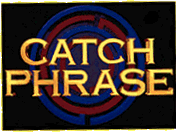
Contents |
Host
Nick Owen (non-broadcast pilot)
Roy Walker (1986-99)
Nick Weir (2000-1)
Mark Curry (2002)
Stephen Mulhern (2013-)
Co-hosts
Voiceovers:
Andrew Lodge (1986)
Nick Jackson (1987-94)
Ted Robbins (1994, 1997)
Charles Foster (1995)
Robin Kermode (1998)
Chris Jarvis (2000-1)
Peter Dickson (2002)
Jonathan Gould (2013-)
Broadcast
TVS in association with Action Time for ITV, 12 January 1986 to 28 October 1994 (171 episodes in 9 series + 1 special)
Co-produced by Meridian, 1993-4
Action Time and Carlton for ITV, 4 November 1994 to 23 April 2004 (183 episodes in 8 series)
STV Productions in association with DRG for ITV, 7 April 2013 to present
Synopsis
Two people attempted to solve Catchphrases (picture puzzles which revealed a phrase, saying, title, whatever - think Dingbats) to win money.
Before each round one person stopped the flashing light and that determined how much money each one in this round was worth. Then, a puzzle came on screen which, after the bell but not before, it was first on the buzzers. If they were right they won the money.
 An example puzzle (answer below)
An example puzzle (answer below)One of the most distinctive things about Catchphrase was that it was one of the first shows to use proper computer animations as part of the game, and even by the end it remained pretty cutting edge. Many of the animations featured a robot called Mr. Chips.
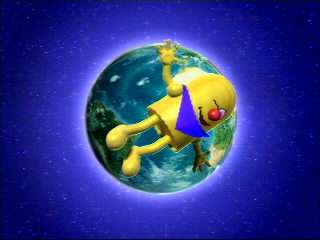 Mr. Chips giving us a wink, the cheeky devil
Mr. Chips giving us a wink, the cheeky devilAfter each puzzle, that person got a chance at the Bonus Catchphrase. This was covered by nine squares. One was picked at random and removed then they were allowed a guess. If they got it right, they won whatever was in the Bonus Bank (originally a flat 100+(round number x 50), eventually turning into 100+ round number times 50, take away 10 for every square already uncovered, plus the number of letters in the month etc...). If wrong, they did another puzzle and so on until someone got it. Repeat as required, sprinkle liberally with extra money for each round.
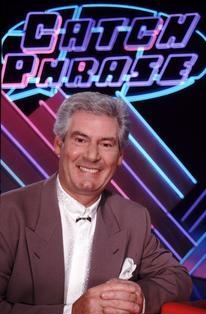 Host Roy Walker on the set of Catchphrase - surely one of the most durable in the business, it hardly changed in over a decade except for the logo.
Host Roy Walker on the set of Catchphrase - surely one of the most durable in the business, it hardly changed in over a decade except for the logo.After the break, there was always the faster-moving Ready Money Round where there was no bell. Which was nice. Incidentally, we're told that one of the reasons that the show had a bell was to slow down the rate that money was earnt, the show gave away potentially large cash prizes and back in the day there were limits TV companies had to adhere to in the prizes they gave away.
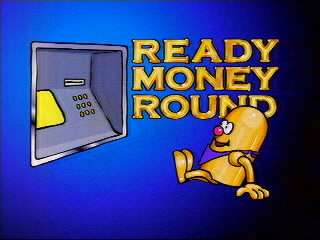 Mr Chips can't believe his luck - it's the Ready Money Round
Mr Chips can't believe his luck - it's the Ready Money RoundThe person with the most money at the end of the show went forth to the Super Catchphrase. A grid of 25 lettered squares flashed up. Behind each one was a Catchphrase. If they got 5, they won an extra £50 (or £500 from 1997). However, if they did that by going through the 'M' square (which they claimed to be the "difficult" one but we personally didn't believe that for a moment) they won a lovely holiday in somewhere exotic like Bali! PLUS! Spending money. Rather disappointingly, nearly all contestants took the vertical route on the board - sure, it was the most obvious route to take, especially while under pressure, but we would have liked to have seen at least some contestants take the horizontal route or one of the diagonal ones, if only for some variety.
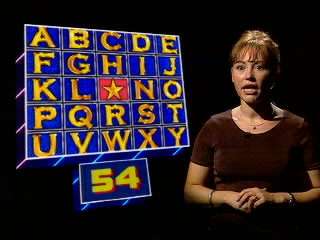 Only 6 seconds into her minute and she's already cracked the M square.
Only 6 seconds into her minute and she's already cracked the M square.Popular show that very rarely had an exciting finish to it - one player nearly always dominated the other. But it still lasted a zillion series. Oh, and the answer is "dishing the dirt".
Catchphrase for The New Millennium
Someone had the sense to give the show a complete re-vamp for its 2000 series. The graphics engine was made sexier and given a new cartoon style. The bonus game was covered by nine shapes as usual, but they weren't necessarily squares. The Ready Money Round was replaced by the Cash Countdown, and the end game was now a Blockbusters-style "get to the other end of the board" thingy, using the same 5x5 letter grid.
Walker was replaced by Nick Weir, who broke his leg during the recording of the first series (in true Matthew Kelly Game for a Laugh style) - and, on his return, welcomed us all to 'Crutchphrase'. He sometimes gave away too many hints, but his performance was much improved since his debut on Waffle.
This package of changes gave the idea a new lease of life, but we weren't sure about the spot prizes, though.
But this relaunch completely bombed with the public, who simply missed Walker, and even a last ditch attempt in 2002 to save the show by moving it to daytime (with new host Mark Curry, who invented a running joke about not having any catchphrases of his own) didn't help. The 'Catchphrase Countdown' just didn't quite have the same ring to it... in fact, they tried avoid any references to cash and points as far as they could and left the viewer to fill in the blanks, in a hilarious and unsuccessful bid to fool slow-witted viewers that it still was a big money gameshow, presumably.
See also: Family Catchphrase, which started as a one-off special of the main show before spinning off into its own series on a different channel.
Catchphrase for the Toy Story generation
And there we thought the story would end. Oh, Catchphrase remained popular on the gameshow rerun channel Challenge, and Chris Moyles had the long-running "Carpark Catchphrase" feature on his Radio 1 Breakfast Show. But the last thing we expected for spring 2013 was a new run of episodes, this time presented by Stephen Mulhern.
There are lots of nods towards the classic era, such as the theme tune being a re-working of the original, a neon light set and all of the original buzzers and jingles still being used. As well as this, there are lots of things to keep the show fresh such as new 3D CGI animations for the catchphrases, a bigger prize and some changes to the rounds.
Round 1 begins with a elimination round with three contestants having to guess quickfire catchphrases until two contestants have guessed three catchphrases correctly. The two winning contestants then proceed to the next round, but the third contestant is sent home. We really don't understand why this was added in at the top of the show with one contestant being eliminated very early because the elimination round is really just padding to fill in the 45 minute time slot and a waste of time for the eliminated contestant. However, in the (largely entertaining) Celebrity charity specials, all three contestants play throughout the game so the elimination round is not played. Why this couldn't have been adopted for the civilian editions remains a mystery!
Round 2 is what we call "Classic Catchphrase", which is basically the show as we know with the same rules that applied from the past years. The values of money for the bonus catchphrase are higher than the past years with £500 to be won in round 2 and £1,000 to be won in round 3, but the only difference is that there is no £10 reduction punishment for every square that is removed if the contestant doesn't know or incorrectly guesses the catchphrase. In the celebrity versions, as alluded to above, Classic Catchphrase begins immediately. Round 1 adopts the £100 and £500 rule with Round 2 designating £200 and £1000 and Round 3 offering £300 per correct answer with a whopping £1500 for the bonus Catchphrase! To quote the Cat from Red Dwarf, 'Well, what the hell - it's for a good cause!'
The final round is as always the dreaded Super Catchphrase. As always, the same rules applied from the past years but the contestant now has to guess five catchphrases correctly by climbing up a pyramid of fifteen numbered blocks consisting of catchphrases within 60 seconds. Each time the contestant guesses a catchphrase correctly on each level from bottom to top, the money increases every time from £2,500, £5,000, £10,000, £25,000 and £50,000. But wait, there's more, No. 11 on the third level has a star in the middle, where if the contestant chooses that number and correctly guesses the catchphrase, they could win a holiday as well. When a celebrity tackles the Super Catchphrase, Number 11 has a different incentive - if answered correctly, the money won for the other celebrities chosen charities gets doubled. Not bad at all!
Despite a rather padded start to the show with its elimination round, it is a warm welcome back to the game show from our past.
Key moments
In one outtake, Walker was caught out with a polo mint in his mouth. "I swallowed it and it came back up!"
Walker gave the wrong answer to a catchphrase that neither contestant had identified. He claimed it was 'Columbo' when it fact it was 'Blue Heaven'. How he managed to confuse the two completely different phrases is anyone's guess.
That bonus catchphrase in 1994:
Ooh, Mr. Chips!
Catchphrases
When a contestant said something really stupid, Walker still insisted, "It's good, but it's not right.". Come on, Roy, it quite blatantly wasn't. Why couldn't you have said "I'm sorry, that was rubbish. Never grace me with your voice again. Ever."?
"Say what you see" was a bonus catchphrase around 1998. Amazingly, no-one got it. Additionally, "Catchphrase" was a catchphrase once... they got that, though.
(At the beginning of the show): "And now - please welcome your host - Mr Catchphrase himself - Rooooy Waaalker!"
"If you see it, say it, and you'll win it"
"Riiiiiiiiiiight!"
"We're taking out the bell"
"It's fast and furious in the Ready Money Round"
"Five seconds... here we go"
"The M square, that's the difficult one"
"What's Mr Chips doing?", or, "There's Chips - what's he doing?"
"There's no such expression" - this always seemed a bit hypocritical, considering how mangled Walker's catchphrases and banter with the contestants could be.
"Watch your screens... here we go!"
"Keep pressing and guessing!"
"You can't win if you don't buzz in!"
"Lots of time - a minute - and if you get stuck, just say 'pass' and we can come back to it - the best of luck - call me a letter"
"Be lucky!"
"Right - next!"
Stephen Mulhern: 'Will the middle solve the riddle?'
Stephen Mulhern: 'Let's remove the square and see what's there'
Inventor
Devised by Stephen Radosh.
Theme music
1986-94: Ed Welch
1994-2002: Simon Etchell (A remixed version of Etchell's theme was used for the Weir and Curry version.)
2013-present: Marc Sylvan & Richard Jacques
Trivia
In the original US show, popular gameshow mascot Mr Chips is called Herbie. He was christened Mr Chips for the UK release because, according to Challenge's 2019 documentary "TV's Greatest Game Shows", he resembled a computer chip.
When the show's original production company, TVS, lost their franchise, their final programme was a look back on their 11 years in operation called 'Goodbye To All That'. Roy Walker was a guest on the programme and recounted an anecdote of the show once running out of catchphrases. The second of the four shows being recorded that day had got through a huge number of phrases that neither contestant knew. The computer files were being flown in on disc from the US, so a bike was rushing to the airport to pick them up. During the filming break, one of the contestants kept nipping back to his dressing room. It turned out that he was taking swigs of booze, and eventually became legless. The reserve contestant was telephoned, but he put the phone down not realising that they needed him immediately and went back to working on his allotment. So a car was dispatched to find him in the gardens and take him back to the studio. But then that car broke down causing a delay, and to cap it all the bike bringing back the catchphrases also broke down. You can find the video fairly easily on YouTube.
Nick Weir revealed in an interview that, after he broke his leg, "My TV career flashed before me", but as it happened, he needn't have worried, because the show's producer came to visit him in hospital and told him that, if he (Weir) was happy to carry on with the show, so were they. Thus, he was reprieved - a shame, then, that his version of the show didn't last very long.
During the Nick Weir era, announcer Chris Jarvis would routinely insult him within the show's introductory voiceover. Real life animosity? Far from it: in fact, Weir himself had a hand in writing them! Well, if you can't laugh at yourself and all that...
Catchphrase was the first ITV game show to resume filming after the Covid-19 lockdown.
Transmission details
Transmissions of Catchphrase were confusing, to say the least. We think the following synopsis is accurate.
- Our story starts with the 1993 TVS/Meridian series where the first 13 episodes aired from 30 October 1993 to 29 January 1994 and the last five episodes aired from 30 September to 28 October 1994.
- Following straight on, the 1994 recording block began for viewers on 4 November 1994, and ran until 3 February 1995 with the first 13 episodes.
- Four episodes were pushed back and weren't aired until 2 to 23 March 1996.
- The 1995 series aired a week after the 1994 series ended with the first five episodes airing from 30 March to 27 April 1996, and the last 14 episodes from 27 September to 27 December 1996.
- The 1997 series had the first 15 episodes airing from 3 January to 9 May 1998 and the last episode on 1 November 1998.
- The 1998 series aired 11 episodes from 21 November 1998 to 27 February 1999 and the last five episodes from 3 October to 13 November 1999.
- When Nick Weir took over hosting the show, the 2000 and early 2001 series were aired in a regular slot.
- The late 2001 series started on 24 November 2002 with only the first episode of that series being aired on that date.
- Episodes 2-8 were scattered all over the schedules in the summer of 2003 from 5 May to 7 September 2003
- Episodes 9-21 were finally settled in the daytime schedule in spring 2004 from 5 to 23 April 2004.
- The 2002 series with Mark Curry had a regular slot in the daytime schedule. 49 episodes aired from 24 June to 30 August 2002 (not 26 August, a bank holiday schedule was used) until Family Fortunes took over its place.
- The last three episodes aired during the Christmas period from 17 to 19 December 2002.
- And after the Nick Weir episodes ended, Catchphrase was off to Challenge for ten years, until Stephen Mulhern's revival.
Merchandise
There was also a Catchphrase puzzle book, board game and a video featuring 500 catchphrases.
Web links
See also
Weaver's Week review (2014)

